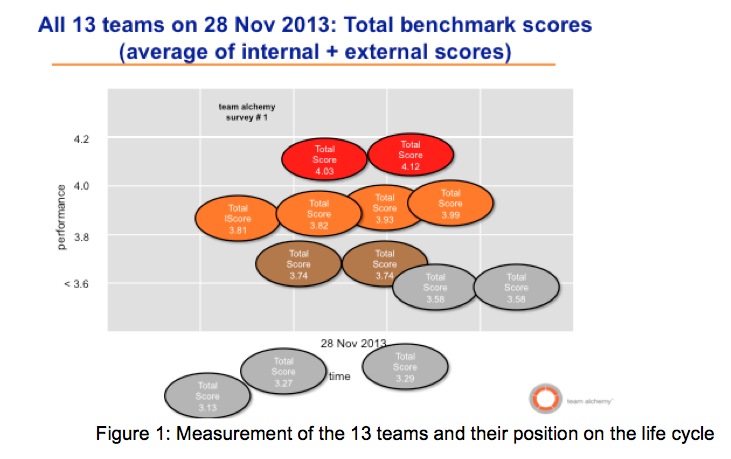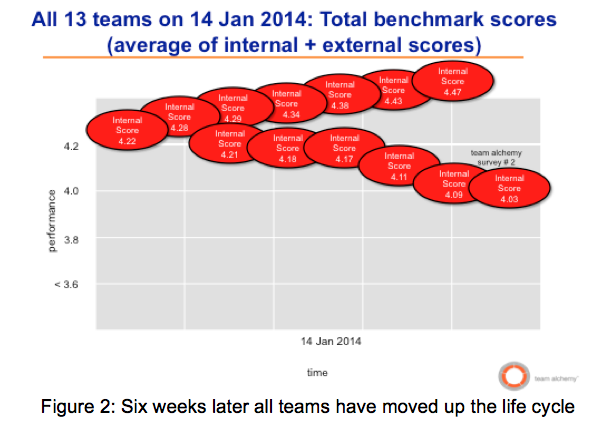
This edition of the blog is brought to you by Andrew Prior, as the second instalment of our four-part series of blog posts guest-written by members of our European Team Alchemy consultant network.
Andrew’s paper focuses on how he has been using Team Alchemy with teams in an engineering and research environment to foster innovation.
- - -
The team alchemy system was used as an education platform in a research centre and graduate school, showing clearly the benefits in learning via disciplined collaboration and self-organising teams.
Since 2009 I have been co-facilitating a personal development and team leadership course to help engineers & researchers to develop emotional intelligence skills. As an experiential learning approach, the course has evolved due to increasing numbers of participants.
In 2013 the participants were organised into 13 teams of six to seven members, depending on interest, personality, gender and culture. Each team identified and developed their own project ideas and over a 12-week period they worked on delivering two outcomes: a project paper and a video of learning experiences on their “team” journey. Early on in the course the teams became aware of the team performance life cycle. Each stage of the cycle has a corresponding “energy” colour as an indication of their team’s situation: traction (grey), calibration (brown), momentum (orange) and team alchemy (red). Every team was challenged to identify and engage three to four key external stakeholders for their projects. After some weeks the team members and their stakeholders gave feedback on how they perceived the team’s performance.
Observations and measurements
Each of the 13 teams was benchmarked at the beginning of their development journey by using a team alchemy online survey.
Both the team and their stakeholders answered behavioural questions based on the six elements of the team alchemy model. The results were mapped onto the team alchemy life cycle (fig. 1).
Two of the 13 teams were rated with a high score greater than 4.0, which relates to a state of team alchemy. Observing these two teams we could see that they were quick in contacting and developing relationships with external stakeholders and aligning their interests into a common direction. There was an “buzz” within their teams.
Five of the teams had slow starts with scores less that 3.6, indicating a state of “team traction” as shown in grey on figure 1. These teams focused mainly inwards and struggled to define their direction or build relationships with stakeholders.
Specific and focused interventions to help move teams through their unque life cycle
Each team was given their own team alchemy survey report describing what they were doing in detail and the reasons behind their scores. These reports were self-explanatory so the teams could easily identify their strengths (elements with scores over 4.0) and take actions to strengthen and maintain them. Next low rating elements (scores of
1. Collaboration Teams with high scores in this element had a strong external focus with a positive approach to identifying key stakeholders and discussing win-win opportunities for their project.
2. Direction For the 5 teams with low scores, their direction and goals were not clear which caused ambiguity and indecisiveness. Lack of action resulted in frustration and a low level of motivation.
3. Team Outcomes. Teams with high scores, designed team dashboards and focused on achieving quick team wins. Celebrating their successes early on, helped with team motivation.
4. Trust & Respect The levels of trust in each team varied depending on how members respected each other’s unique personalities, culture, strengths and contributions. Trust (unearned) led to openness, more disclosure and exploration on each other’s preferred team roles and unique way of working.
5. Dialogue High scoring teams made good use of the diversity of their members by developing ground rules for meetings. High performing teams used “methods” that made it easier to put difficult issues on the table and really listen to each other’s views.
6. Accountability Several teams fell into the trap of constantly planning and doing, while others invested time to review project milestones and were proud of what the team had learned together. High scoring teams also gave each other feedback to confront reality and took action to eliminate ineffective behaviours hindering team performance.
Impact of participants, staff and stakeholders
Each of the 13 teams was measured again in a second survey, just before the end of the course.

All teams had team alchemy scores of above 4.0 as seen from figure 2 above. Staff and stakeholders observed a remarkable change in the behaviours of the participants. With their projects completed, team pride was high. Working and learning together in such a collaborative environment was fulfilling.
The faculty involved in coaching the teams were implicated in the projects in a deeper way and were able to give accurate feedback that complemented the information in the reports and gave practical tips for developing the teams’ performance step by step.
Conclusions
Applying a team performance system as an education platform in a research centre helped develop emotional intelligence skills and improve engagement at all levels of the organisation. This created outstanding results, synergistic relationships and accelerated learning for everyone involved.
- - -
Andrew Prior has over 10 years experience as an innovation facilitator and coach helping private and public organisations to improve their performance through disciplined teamwork and collaboration.



Leave a Comment
Required fields are marked *.